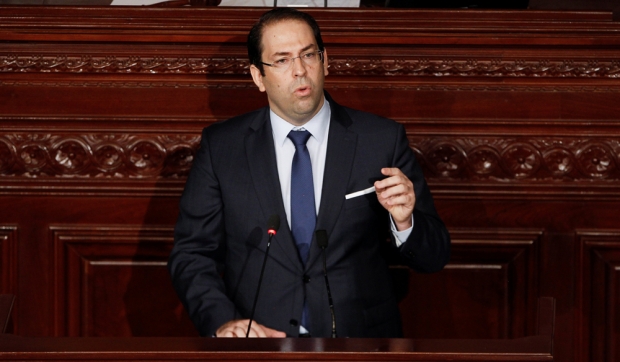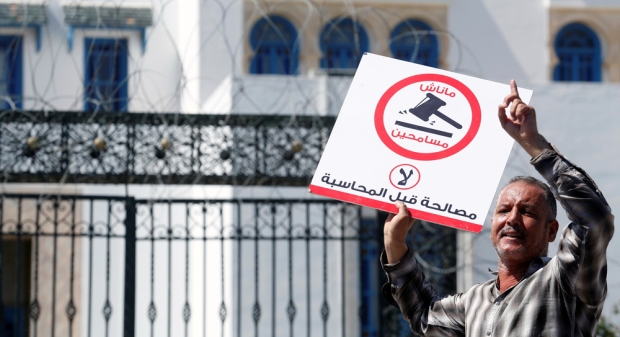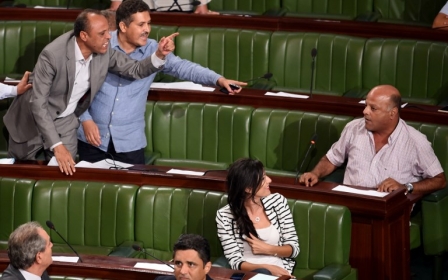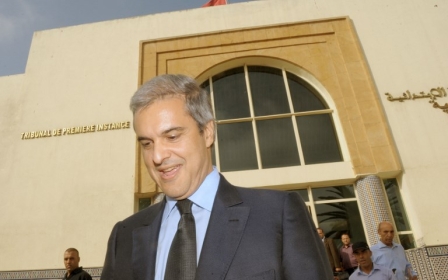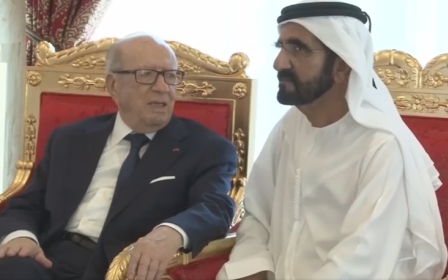Tunisian activists prepare to battle amnesty law for corrupt politicians
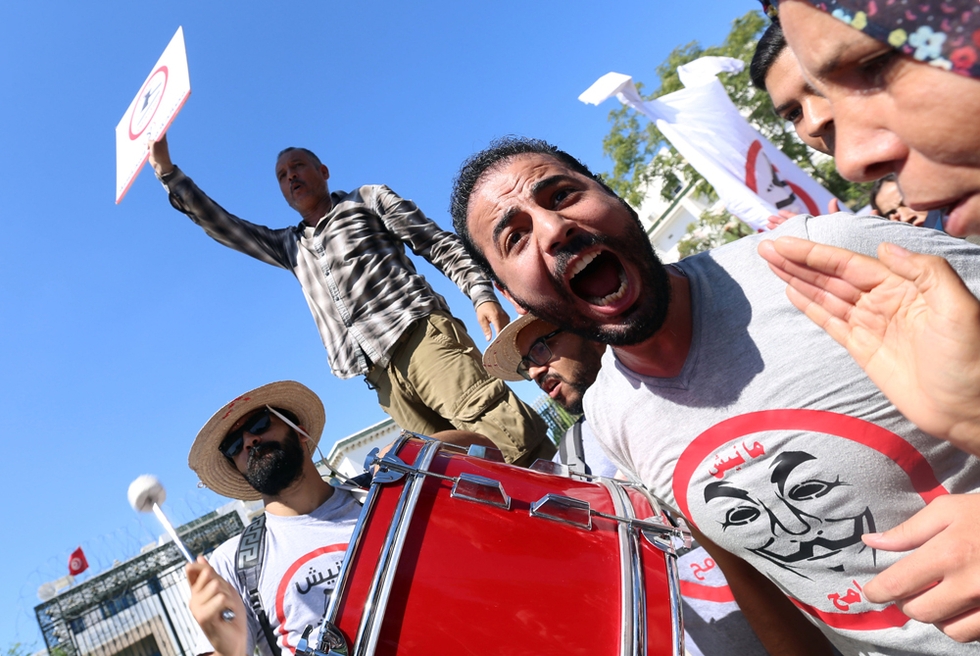
TUNIS - Opponents of a move to exempt Tunisian civil servants from corruption inquiries are gearing up for legal battles and mass protests, saying the new law is a "total contradiction" of the revolution that ushered in promises of democracy and accountability after decades of autocratic rule.
Parliament on Wednesday passed President Beji Essebsi's "administrative reconciliation" law, which will effectively exempt from punishment corrupt functionaries who served under President Zine el-Abidine Ben Ali.
It comes just weeks after Essebsi reshuffled his cabinet, placing several former Ben Ali loyalists, some of whom are tainted by claims of corruption during his reign, back in positions of power.
This law is a total contradiction of the efforts of the revolution
- Nada Triugi, Manich Msamah
"This law is a total contradiction of the efforts of the revolution," said Nada Triugi, from the Manich Msamah ("We will not forgive") movement. "It undermines the efforts to create a legal framework to move beyond corruption and impunity, and that fosters fairness."
Demonstrations are being organised in Tunis on Saturday afternoon to protest against the law, which when first proposed in 2015 promised an amnesty for businessmen, a proposal removed in later forms after strong civil society pressure.
"We now won't know the truth, or be able to deconstruct how the system used to work. The administration can return to business as normal, and they will not be clean."
Monica Marks, a visiting fellow at the European Council on Foreign Relations, said called the amnesty law "unnecessary and harmful".
"It was the first and only law that the president has proposed. Why? Because he wanted to repay the businessmen and public officials who had been close to Ben Ali, and who were the main engine of Nidaa Tounes' [Essebsi's political party] electoral success in 2014."
A government spokesman did not return requests from Middle East Eye for comment. The government has previously said, however, that the law was required because those fearing prosecution are not investing, leading to the economy's poor performance in the post-revolutionary period.
Marks said that the arguments about the economy did not stack up, however, noting that there was already a path for businessmen to avoid prosecution under the country's widely-respected transitional justice system.
"The reconciliation law is designed to undermine transitional justice," she said. "It's an opaque legal mechanism that is letting the powerful off the hook."
The passage of the law is not the only reason that some Tunisians are worried that the gains of the revolution are being reversed, however.
Rollback to the regime
A reshuffle of prime minister Youssef Chahed's cabinet on 6 September saw three ministers appointed who had previously served under Ben Ali. It was this reshuffle that created what the prime minister called the "war cabinet" to fight corruption and terrorism.
"Just as the revolution happened in steps, so the counter-revolution is happening bit by bit," said Mohamed Dhia Hammami, a Tunisian political analyst, when asked of the significance of the move.
"Since Essebsi became president, the reintegration of Ben Ali figures has been happening steadily."
Older people have a nostalgia for the past... Younger people have a different conception of democracy
- Mohamed Dhia Hammami, political analyst
Hammami highlighted the case of Ridha Chalghoum, who was Ben Ali's finance minister at the time he was overthrown.
In February 2016, Essebsi appointed him an adviser for economic reform. In June this year, he became chief of staff for Chahed, and has now been appointed finance minister again.
"There is an age gap between those who are pushing forward and those who are pushing back," Hammami told Middle East.
"Older people, particularly those who worked under Ben Ali, have a nostalgia for the past, for the macroeconomic indicators that they thought meant things were going well."
"Younger people, who are the first to be repressed, have a different conception of democracy: one which is open, transparent, and socially just."
'An old regime thing to do'
Marks, the scholar, also highlighted the expulsion last week of Moulay Hicham, a dissident Moroccan prince who had arrived in Tunis to speak at a Stanford University symposium on governance, democracy and security.
"This was a very old regime thing to do," said Marks.
Hicham told Nawaat, a Tunisian news site, that the police had taken him to the airport from his hotel, and refused to provide a reason for his expulsion, but confirmed that he had not committed any crime.
"I believe there was severe shortcoming, as this was the result of an executive decision that bypassed any judicial control and parliamentary oversight," Hicham said.
He refused to answer questions about whether he thought pressure from Morocco or other regional actors was behind his expulsion, however, a commonly expressed theory.
In a move that provoked additional worries about the intentions of those in government, Essebsi recently gave an interview in which he called for reform of the constitution to place more power in the presidency.
"The current political system cannot ensure the development and stability of the country," he said, bemoaning the "independence" of various arms of government.
While Essebsi has also blamed this weakness for the continued postponement of municipal elections in the country, Hammami is sceptical.
"Local elections would reinforce the democratic system and see the emergence of new political actors," he said "That is one of the reasons why the government doesn't want them to happen."
Constitutional battle
Triugi, the spokesperson for Manich Msamah, said that the movement was now mobilising, along with opposition political parties, in order to have the law struck down at the final stage, as it needs to get the approval of a commission that reviews the constitutionality of new laws.
The country still does not have a constitutional court, despite the fact one should have been formed in the first six months after the passing of the constitution, in January 2014.
"If the committee finds the law is unconstitutional then it will be dropped, despite parliament voting for it," Triugi said. She told Middle East Eye that 35 opposition politicians have signed a petition asking the committee to drop the law.
The opposition is also mobilising for a day of street protests on Saturday in Tunis, with Manich Msamah calling its march "persistence against the rule of mafias".
"We have hopes that protests tomorrow will be joined by many people as they have been organised by a broad section of civil society," Triugi said.
"Wednesday was a critical battle in the war between people who want to return to the status quo and those who want to drive forward reforms," said Marks.
"Things now could go either way."
New MEE newsletter: Jerusalem Dispatch
Sign up to get the latest insights and analysis on Israel-Palestine, alongside Turkey Unpacked and other MEE newsletters
Middle East Eye delivers independent and unrivalled coverage and analysis of the Middle East, North Africa and beyond. To learn more about republishing this content and the associated fees, please fill out this form. More about MEE can be found here.


